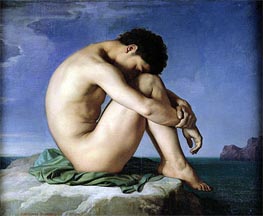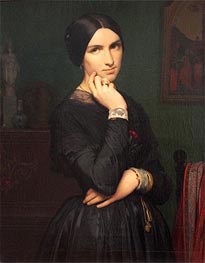
Hippolyte Flandrin Painting Reproductions 1 of 1
1809-1864
French Neoclassical Painter
Hippolyte Flandrin emerged in 19th-century France as a painter who delicately balanced the classical with the contemporary. Born on 23 March 1809 in Lyon, he was the middle child among three brothers, all of whom pursued the path of art. Early on, Hippolyte displayed a keen fascination with painting, a passion that would define his life's journey.
In 1829, with limited means but abundant ambition, Hippolyte and his younger brother Paul made their way to Paris. They initially studied under Louis Hersent, but fate led them to the studio of Jean-Auguste-Dominique Ingres. Ingres became more than a mentor; he was a lifelong friend who profoundly influenced Hippolyte's artistic development. Just a few years later, in 1832, Hippolyte's talent was recognized when he won the prestigious Prix de Rome for his painting "Recognition of Theseus by his Father." This accolade not only affirmed his skill but also liberated him from the constraints of poverty.
The award granted him the opportunity to study in Rome for five years. During this period, his work flourished, gaining admiration both in Italy and back home in France. One of his notable creations from this time was "St. Clair Healing the Blind," intended for the Nantes Cathedral. This piece later earned him a first-class medal at the 1855 exhibition. Tragically, the original was lost in the devastating fire at Nantes Cathedral on 18 July 2020.
Upon his return to France, Flandrin's reputation soared. In 1853, he was elected to the Académie des Beaux-Arts, a testament to his standing in the artistic community. Commissions poured in, most notably for monumental decorative works in several churches. His frescoes adorned the walls of St Germain des Prés in Paris, the church of St Paul in Nîmes, and St Vincent de Paul in Paris, among others. These vast projects showcased not just his mastery of form and composition but also his ability to infuse sacred spaces with a profound sense of spirituality.
Perhaps one of his most celebrated works is "Jeune Homme Nu Assis au Bord de la Mer" (1836), housed in the Louvre. The painting captures a young man seated by the sea, rendered with a serene simplicity that speaks volumes about Flandrin's neoclassical style. The figure's contemplative pose and the subtle play of light and shadow reflect a deep introspection, inviting viewers to pause and reflect alongside him.
In his personal life, Flandrin married Aimée-Caroline Ancelot in 1843. Their son, Paul Hippolyte Flandrin, continued the family's artistic legacy as a painter of sacred art and portraits. Despite his successes, Hippolyte's dedication to his craft took a toll on his health. The years of laboring in damp churches weakened him, and in an attempt to recuperate, he returned to Italy in 1863. Sadly, he contracted smallpox and passed away in Rome on 21 March 1864, just shy of his 55th birthday.
Hippolyte Flandrin's legacy is one of quiet strength and enduring influence. His works, rooted in neoclassical tradition yet imbued with personal sincerity, continue to resonate. They offer a glimpse into a world where art serves as a bridge between the earthly and the divine, capturing moments of human vulnerability and transcendence. For art enthusiasts, his paintings remain a testament to the profound impact one artist can have on the cultural fabric of his time.
In 1829, with limited means but abundant ambition, Hippolyte and his younger brother Paul made their way to Paris. They initially studied under Louis Hersent, but fate led them to the studio of Jean-Auguste-Dominique Ingres. Ingres became more than a mentor; he was a lifelong friend who profoundly influenced Hippolyte's artistic development. Just a few years later, in 1832, Hippolyte's talent was recognized when he won the prestigious Prix de Rome for his painting "Recognition of Theseus by his Father." This accolade not only affirmed his skill but also liberated him from the constraints of poverty.
The award granted him the opportunity to study in Rome for five years. During this period, his work flourished, gaining admiration both in Italy and back home in France. One of his notable creations from this time was "St. Clair Healing the Blind," intended for the Nantes Cathedral. This piece later earned him a first-class medal at the 1855 exhibition. Tragically, the original was lost in the devastating fire at Nantes Cathedral on 18 July 2020.
Upon his return to France, Flandrin's reputation soared. In 1853, he was elected to the Académie des Beaux-Arts, a testament to his standing in the artistic community. Commissions poured in, most notably for monumental decorative works in several churches. His frescoes adorned the walls of St Germain des Prés in Paris, the church of St Paul in Nîmes, and St Vincent de Paul in Paris, among others. These vast projects showcased not just his mastery of form and composition but also his ability to infuse sacred spaces with a profound sense of spirituality.
Perhaps one of his most celebrated works is "Jeune Homme Nu Assis au Bord de la Mer" (1836), housed in the Louvre. The painting captures a young man seated by the sea, rendered with a serene simplicity that speaks volumes about Flandrin's neoclassical style. The figure's contemplative pose and the subtle play of light and shadow reflect a deep introspection, inviting viewers to pause and reflect alongside him.
In his personal life, Flandrin married Aimée-Caroline Ancelot in 1843. Their son, Paul Hippolyte Flandrin, continued the family's artistic legacy as a painter of sacred art and portraits. Despite his successes, Hippolyte's dedication to his craft took a toll on his health. The years of laboring in damp churches weakened him, and in an attempt to recuperate, he returned to Italy in 1863. Sadly, he contracted smallpox and passed away in Rome on 21 March 1864, just shy of his 55th birthday.
Hippolyte Flandrin's legacy is one of quiet strength and enduring influence. His works, rooted in neoclassical tradition yet imbued with personal sincerity, continue to resonate. They offer a glimpse into a world where art serves as a bridge between the earthly and the divine, capturing moments of human vulnerability and transcendence. For art enthusiasts, his paintings remain a testament to the profound impact one artist can have on the cultural fabric of his time.
3 Hippolyte Flandrin Paintings

Nude Youth Sitting by the Sea 1836
Oil Painting
$1773
$1773
Canvas Print
$68.19
$68.19
SKU: FLH-7626
Hippolyte Flandrin
Original Size: 98 x 124 cm
Louvre Museum, Paris, France
Hippolyte Flandrin
Original Size: 98 x 124 cm
Louvre Museum, Paris, France

Madame Hippolyte Flandrin 1846
Oil Painting
$2117
$2117
Canvas Print
$67.25
$67.25
SKU: FLH-10560
Hippolyte Flandrin
Original Size: 83 x 66 cm
Louvre Museum, Paris, France
Hippolyte Flandrin
Original Size: 83 x 66 cm
Louvre Museum, Paris, France

Marie-Anne de Bourbon, Duchesse de Vendome 1839
Oil Painting
$2201
$2201
SKU: FLH-10561
Hippolyte Flandrin
Original Size: 77 x 59 cm
Museum of Palace of Versailles, Paris, France
Hippolyte Flandrin
Original Size: 77 x 59 cm
Museum of Palace of Versailles, Paris, France